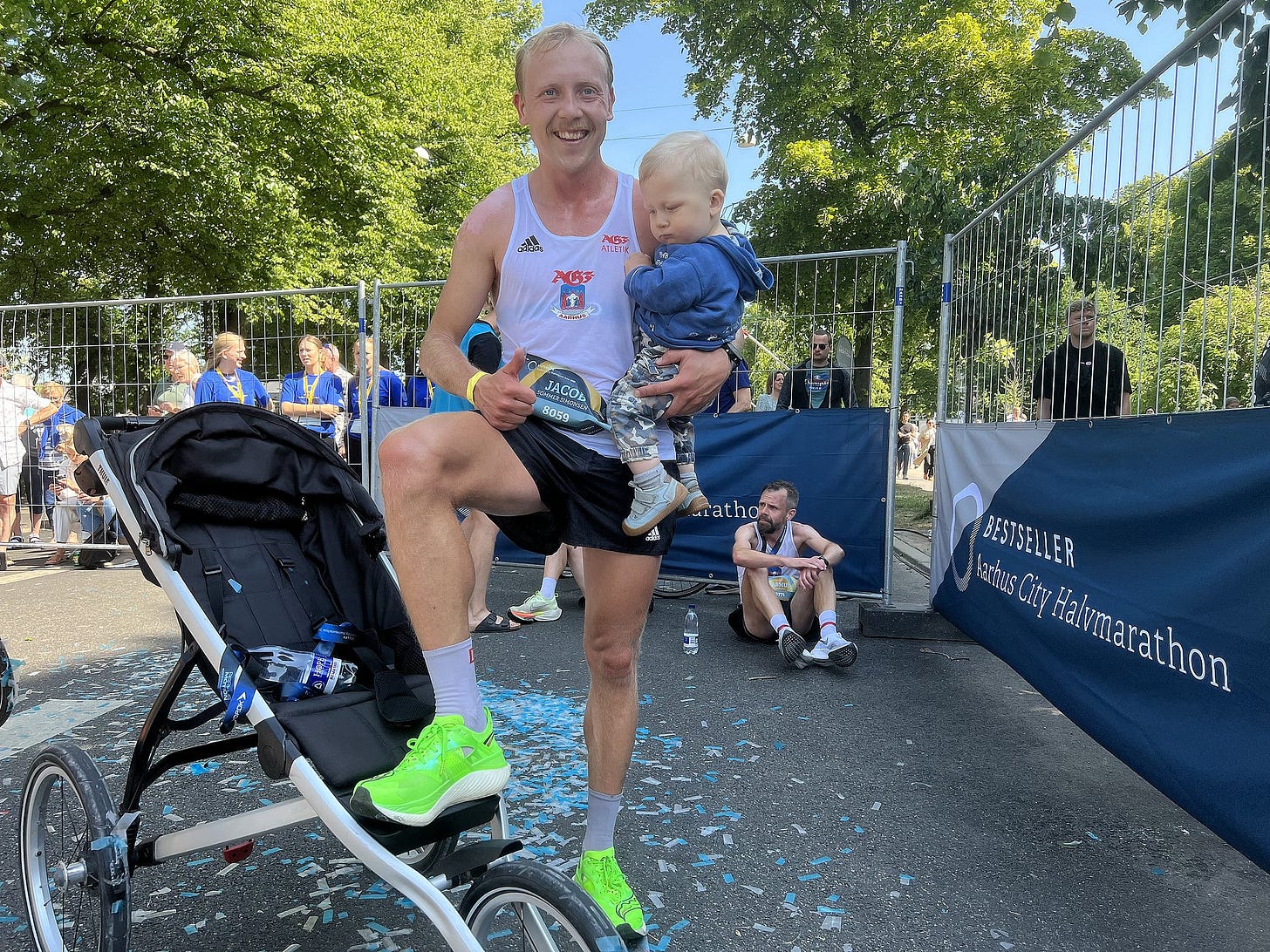Balancing fatherhood with an Olympic dream
Danish Olympic marathon hopeful Jacob Sommer Simonsen talks about running a 68-minute half marathon with a stroller (!!) and how being a father affects his running practice.
Jacob Simonsen hit headlines last summer when he ran a 68:04 half marathon in his hometown of Aarhus, Denmark. The world record is 57:31, so what was the big deal? He ran the whole thing while pushing his then one-year-old son, Viggo in a stroller.
A national team runner, Jacob is hoping to qualify to represent Denmark in the marathon at the Paris Olympics this summer. Having set a personal best time of 2:11:22 in Valencia late in 2023, he’s hoping to run a fast time in the National Championships at the Copenhagen Marathon in May to get the necessary ranking points to help him qualify.
With that (incredibly high) base of being an elite runner, Jacob decided to have some fun and take the Guinness World Record from one of his good friends.
“It was a tough record, actually! It was 68:38 before. I didn't really know what I was getting into, but it turned out to be really, really tough.”
The following month, Jacob competed in the Beer Mile World Classic in Chicago, and finished 7th. That race was won by Canadian titan, Corey Bellemore, who completed the race with just one shoe.
“It’s all about having fun.” Jacob Simonsen
Denmark vs USA
“Like all Danish kids,” Jacob started out playing soccer but “found out that [he] was better at the running side of it.” After running a 5k race “really fast” on vacation as a young teenager, he credits a Norwegian girl for introducing him to the concept of running as a sport. Up until that moment, he had never considered it.
“I signed up for a running club when I came home, I did really well in the first first practice, and from there I was hooked.”
Jacob went all in on running when he was 15 or so and won a university scholarship to run for the University of New Mexico Lobos - a D1 school. Despite enjoying the experience of meeting other athletes “on [his] level and a lot better than [him],” including Scottish World Champion Josh Kerr, he found the American culture of winning at all costs uncomfortable.
“It was another system compared to back home in Denmark. The relationship with the coach is much more strict. Here in Denmark, it’s much more like a conversation, whereas in the U.S. the coach gets paid when you perform well, and I didn't really fit into that system.”
“I was injured a lot and the coach will be like, ‘Do it anyway,’ whereas in Denmark, your coach will say to take a couple of days off and focus more on the long term. I understand the coaches get a lot of pressure for the athletes to perform, but I think one of the issues when it comes to collegiate runners is that having that pressure from the coach is not that healthy.”
Having moved to Los Angeles from London myself, I keenly appreciate these differences in culture. I’ve written before about the Capitalist nature of running. It’s maybe the most perfect American sport, reflecting the values of this country so perfectly - both economic and social. Running is all about individualism and winning. It’s about improving and succeeding.
The pursuit of those ever-increasing goals can sometimes take an ugly path. Too ugly for some.
“Some people thrive in that system - if you're robust enough and don’t get injured. I just needed another kind of relationship with my coach, which I got when I came back home. I really progressed from there.”
What is it about his current Danish way of life that is so different to those college years?
Americans often like to point to Denmark and other Scandinavian countries for their healthcare and better quality of life as either aspirational or out of our reach, and it is. Both, probably.
Finland (not technically Scandinavian, let’s not argue) is the happiest country in the world seven years running for a reason. Those baby boxes the Finnish government gives to new parents? It’s not the sole reason Finns are happier than Americans, but it’s indicative of the gentler, more thoughtful nature of their society, perhaps.
We talk about Norwegian prisons looking like four-star hotels, but it’s because they want to return people to society in a healed and functional state. They want to rehabilitate, not punish. It’s the opposite of the cancel culture propagated so freely in the USA. It speaks to the long-term philosophy Jacob prefers and enjoys with his coaches now.
While his main motivation now is to run fast times, Jacob talks about enjoying the progression found in sticking to long training blocks and “working on [his] weaknesses.” When we talk about what running culture means to him, he returns to the idea of community and communication.
“I think of a community where everybody can talk to each other. I feel like it's such a social sport. Even though it's individual, you train with groups. I really enjoy training with people on easy sessions, and having that community. You get friends for life.”

Father or runner (or doctor?)
About that Guinness World Record, though. Sure, Jacob planned to run that half marathon with his son, but for most of us, running with a stroller is a necessity. It’s the only way we can get out for a run. Yes, having children can be a choice, but it’s also fine to acknowledge the new scheduling difficulties that parenthood can force upon our lifestyles.
How has fatherhood affected Jacob’s running practice?
“That's just another factor in life now. I have a really solid support system in my girlfriend. She does the hard pushes with Viggo, like staying up at night, for example, but in terms of training, I definitely have to be more flexible in terms of time. If I'm alone with Viggo, I need to make sure that I'm on top of the time schedule. If he's sick or something, I'll have to change my goal going into the training session.”
Behind every great man is a great woman, as the saying goes, and Jacob is keen to acknowledge it. Indeed, when I ask him about the part of running that he finds most difficult, it strikes me how thoughtful and well-adjusted he is.
“Now. I say that the difficult part is whenever I go for a run, I have the feeling of not being able to give 100% within the family. It's all on Sidsel, my girlfriend. She's really supporting me a lot, so I have to pay it back at some point.”
“The good thing about it is that we talked a lot about how Viggo would influence both of our lives. Mine, in terms of my pursuit to make it to the Olympics and to really see how far I can make it in running, and she was really supportive, so I feel guilty, but we both knew that this was one of the things that would happen.”
Communication, again! It’s the most important thing in relationships, isn’t it? It’s something that we’ll spend thousands of dollars in therapy bills on trying to figure out, and here they are putting me to shame, at least.
An additional factor in Jacob’s life is that he is also studying medicine - a difficult enough endeavor without being a father and Olympic hopeful as well.
“The main difference for me is that Aarhus University has an elite athlete program to help my schedule. I'm in med school, but instead of doing it in six years, I'll be doing it in eight, nine, even 10 years. I'm spreading it out, so my workload is not as big, so I can be more flexible in my everyday life.”
I question whether that kind of flexibility is something that’s even possible in the States. I feel like it’s more common to hear tales of burnout and a severe lack of work-life balance than any institution catering to the specific needs of an individual. The good of society be damned! There is another way, of course. Jacob is living proof.
If planning with one’s partner and identifying difficulties so as to mitigate problems, slowing down the advancement of your career, and acknowledging the sacrifices of your partner isn’t enough, Jacob goes on to explain how he also tries to focus on being present with his family (not scrolling Instagram) when he’s at home. It makes sense that someone with an elite athlete’s mindset is sure to maximize every moment. Jacob has a full life, and it seems like he’s ensuring he makes the most of it.
Jacob will find out if his Olympic dream will become reality on 05 May. I hope Viggo will get to see his dad run around Paris this summer, but whatever happens on that Sunday morning, Jacob has set up both his personal and professional life thoughtfully - in the right place, with the right people. That’s a real blueprint for success.
Ways to make running suck less (if you’re a parent)
Get a running stroller
Be gentle with your body
Talk about your time needs with your partner
See if your employer/educator allows flexibility
Live in a country that thinks and cares about its citizens
Make sure the time you spend with your family is high quality time!
Running Sucks Haiku of the Week
Running on no sleep
It’s what they do in ultras
Parents train so hard
If you know someone who’s a parent of a young child and they’re performing literally anything at a decent level (I do not include myself in this because I do not perform at a decent level on no sleep), just understand that they are superhuman. Normal humans need 8hrs of sleep a night. Dakota Johnson gets 12! Is this why we’re seeing all these young mothers absolutely crushing it in races? It’s a different level of grit and determination.
Housekeeping
MERCH - Get your Running Sucks stickers. You get THREE MONTHS of upgraded subscription included for FREE, which is 36 bonus competition entries. It’s a good deal.
WIN - Click here to win a $50 Janji gift card. There were 32 entries last week and Dominic won. I’m wearing my Janji shorts right now. (It feels like summer.)
$$$ - Upgrade your subscription for $30 OR tip a one-off $3 if you enjoyed reading this. You get bonus entries for free running clothes. It’s an economic no-brainer.
CONNECT - Join the Running Sucks Discord server and follow me on Instagram. I’ve got a plan for both, I promise!
INTERVIEW - Breakfast Club by Sam Robinson was a Substack featured publication the same week as Running Sucks, so it was a real pleasure to talk to Sam about my running and writing practice. Read it!
Sam is one of the ineffably cool people that I’m so happy to have met via Substack so make sure you sign up to his newsletter. You will not regret it!
Further reading
Jacob Simonsen [IG] [Wiki] [World Athletics]
The Beer Mile [WEB]
World Happiness Report [CNBC]
Finnish Baby Box [BBC] [Oregon.gov]











Really interesting as ever Raz, and I say the following while acknowledging a) the difference in the populations of Denmark/Scandi countries generally, and b) winning isn't everything, BUT... there are an awful lot more US Olympic and world champions than there are Danish ones (I can't think of any super successful Danish runners, and Jakob Ingebrigtsen - Norway, of course - is the only really big name Scandi runner who comes to mind). So maybe there is something to say for working top-level athletes hard at certain times? Not that I'm any kind of expert at all... just a Devil's Advocate thought! Also, taxes in Finland are REALLY high!! lol